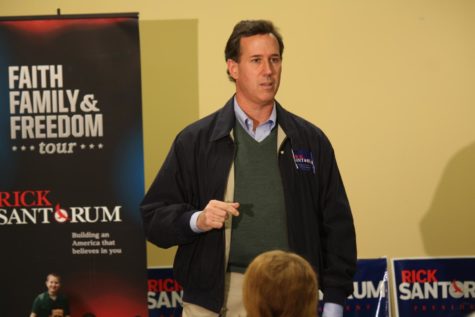Editorial: Working with other labels is part of our political inheritance
November 30, 2011
Newt Gingrich’s, R-Ga., pragmatic approach to immigration policy, which he articulated in the most recent debate among the Republican candidates for the presidency, quickly drew sharp criticism from other members of the field, especially Michele Bachmann, R-Minn.
Rule of law and order are two important parts of any brand of conservatism, but tradition, religion and family also play highly important roles. And it’s there that Gingrich’s reasoning makes sense. Instead of rigidly clinging to a set of ideals that sees residents of America who are either in the United States legally or illegally, he considers whether they have a vested interest in their communities.
Last Tuesday, Gingrich staked out his position: “If you’ve been here 25 years and you got three kids and two grandkids, you’ve been paying taxes and obeying the law, you belong to a local church, I don’t think we’re going to separate you from your family, uproot you forcefully and kick you out.”
The kind of immigrants Gingrich wants to keep here, illegal or not, are the kind of immigrants who built the foundations of United States and who kept building on that foundation, raising it to new heights. Peaceful, temperate, hard workers who raised families here and paid their taxes are the ones who deserve to be here most.
Now contrast Gingrich’s apparent valuing of family and community with Bachmann’s criticism of that position: It’s the most liberal of any Republican candidate.
So? “Liberal” is not a dirty word? Ideas should not be excluded from public debate simply because they don’t match a party’s stated positions.
Elected assemblies exist so that representatives can debate and decide the best solution, not state their own talking points and ignore everyone else’s. Our first president, who put his fortune at his country’s disposal, urged us to dispense with factional labels. The author of our Declaration of Independence said in his inauguration speech that we are all members of one party, not members of factions.
Neither party seems interested in working toward a solution, sacrificing some of what it wants to what is best for the United States. Over the past year we have lurched from one debt ceiling crisis to another, suffering a bond rating downgrade and numerous large stock market losses inspired by the uncertainty that goes with 11th-hour agreements. Now we seem content abdicating our power to spend money to a time now that the supercommittee members have failed to reach an agreement, $1.2 billion in cuts will go into effect as soon as January 2013.
Considering ideas that fall outside our own labels is part of our political tradition. If the allegedly conservative candidates truly want to restore the America of the founding generation, they will debate the idea on its merits, not its label.







